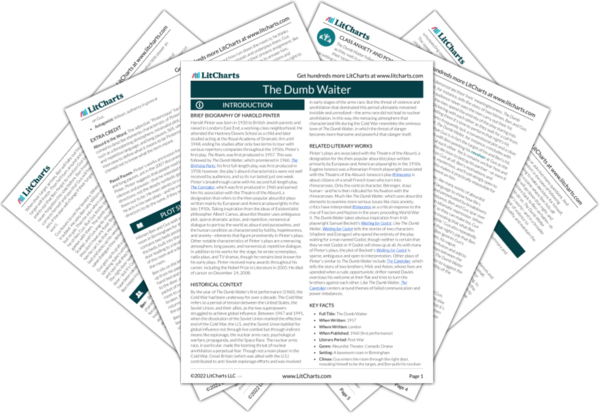The dumb waiter represents power imbalances and the power of authority. A dumbwaiter is a small, elevator-like platform used to carry items (usually food or prepared dishes) between the different levels of a building. In early-20th-century London, they were common fixtures in the houses of the privileged; domestic servants would use them to move laundry between different rooms of the house. By virtue of its historical use alone, the dumbwaiter functions as a symbol of class disparity: the way a dumbwaiter physically distances the lower classes from the upper classes they serve illustrates the way that Ben and Gus’s and Wilson’s different socioeconomic statuses create a power imbalance between them. As working-class men, Ben and Gus are at the mercy of Wilson, their boss, and the way they use the dumbwaiter to communicate demonstrates this power imbalance. Midway through the play, Wilson (one presumes—it’s never made clear who is upstairs) begins using the dumbwaiter to send Ben and Gus food orders written on pieces of paper. The orders come with no notes of explanation, and Ben and Gus lack the kitchen appliances and food necessary to fill the orders. Put simply, they’re at a complete loss as to why Wilson is sending them these orders and what he wants them to do. In this way, the dumb waiter shows how Wilson’s position of authority allows him to intimidate, manipulate, and exploit Ben and Gus without repercussion. The food orders confound Ben and Gus, yet they (and in particular Ben) are too terrified of disobeying and upsetting an authority figure to question Wilson’s motives or explain that they are unable to fulfill his requests. Because Ben and Gus cannot communicate directly with Wilson, they remain uncertain about how to properly fulfill his requests and avoid punishment—and this leaves them utterly ill-equipped to do anything to improve their situation.
The dumb waiter also demonstrates how Ben and Gus’s power imbalance pits them against each other, ultimately playing a key role in Ben’s betrayal of Gus. Eventually, Ben and Gus discover that the dumb waiter comes with a speaking-tube that people on different floors of the building can use to listen and speak to each other—this facilitates communication somewhat, but there are serious limitations. Only one person at a time can listen to or speak into the tube, and so it’s only Ben, Gus’s superior, whom the dumb waiter grants direct communication with Wilson. This means Gus must rely on Ben to relay Wilson’s messages—and it also means he must trust that Ben is being truthful about what Wilson is saying. And with Ben’s climactic betrayal of Gus (at the end of the play, it’s revealed that Gus is the target that Ben must kill), the play makes it clear that Gus cannot trust Ben—yet his lower status leaves him with no other option. The dumb waiter thus shows how Gus’s low-ranking position leaves him vulnerable to manipulation by authority figures that he can neither fight nor understand.
The Dumb Waiter Quotes in The Dumb Waiter
GUS (thoughtfully). I find him hard to talk to, Wilson. Do you know that, Ben?
BEN. Scrub round it, will you?
Pause.
GUS. There are a number of things I want to ask him. But I never get round to it, when I see him.
GUS. […] Do you mean I can keep the Eccles cake then?
BEN. Keep it?
GUS. Well, they don’t know we’ve got it, do they?
BEN. That’s not the point.
GUS (calling up the hatch). Three McVitie and Price! One Lyons Red Label! One Smith’s Crisps! One Eccles cake! One Fruit and Nut!
BEN. Cadbury’s.
GUS (up the hatch). Cadbury’s!
BEN. […] Do you know what it takes to make an Ormitha Macarounada?
BEN. Do you know what he said? Light the kettle! Not put on the kettle! Not light the gas! But light the kettle!
GUS. How can we light the kettle?
BEN. What do you mean?
GUS. There’s no gas.
GUS. […] What about us?
GUS. […] We send him up all we’ve got and he’s not satisfied. No, honest, it’s enough to make the cat laugh. Why did you send him up all that stuff? (Thoughtfully.) Why did I send it up? […]
GUS. What do we do if it’s a girl?
BEN. We do the same.
GUS. Exactly the same?
BEN. Exactly.
Pause.
GUS. We don’t do anything different?
BEN. We do exactly the same.
GUS. Oh.

















